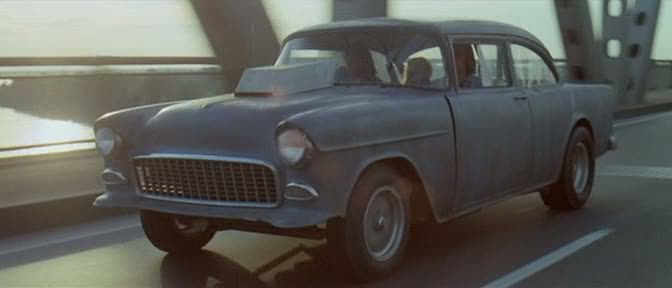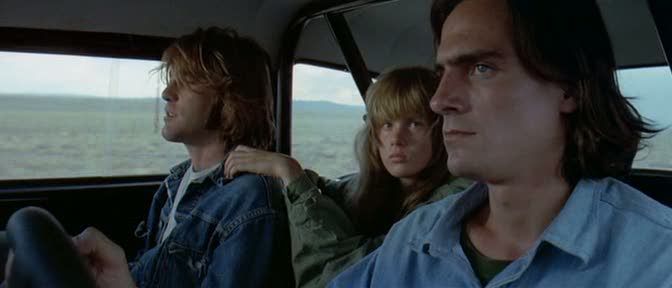
The drivers in Two Lane Blacktop, men behind the wheels of powerful muscle cars, racing one another for money and pride and just for the hell of it, are true outcasts, existing in a strange world somewhere outside proper society, lingering on the fringes wherever they go. They seemed to have formed their own private world and their own language, an obscure lingo of car parts, numbers, makes and models, speeds, transmissions. They speak entirely in the language of cars, seemingly incapable of talking about anything else. Their whole way of living, their way of thinking, is centered around cars: driving them, racing them, scratching together money to fix them or upgrade them, setting arbitrary destinations just so that when they get there, they can drive some more, race some more, come up with a new destination. They don't even have names, not really; they're credited simply as "the driver" (singer James Taylor), "the mechanic" (Beach Boy Dennis Wilson), "G.T.O." (Warren Oates), the latter synonymous with the make of the car he drives. The hitchhiker they pick up along the way is called simply "the girl" (Laurie Bird), and none of them seem to know her name either, though she flits between them, bored and trying to find someone who thinks about more than cars.
She's mostly out of luck with this crew, though. Taylor and Wilson pick her up while driving around the West looking around for races in their grey '55 Chevy. She goes to bed with Wilson when they first pick her up, but most of the time she's simply sprawled out in the back of their car, a quiet presence on the edges of their vision, crowded out by their laconic shop talk and engine tweaking. During their travels, the two young men run across the somewhat older Oates, who's not a car guy in the same sense as they are: he bought his way into this scene through his supercharged yellow G.T.O., while they more or less constructed their ride from scratch. He only knows as much as is available in his owner's manual, and even then he can mostly just recite the figures without understanding them. What he shares with the Chevy's crew is an aimless wanderlust, a constant need to be on the road, on the move, never settling into one place. He may have been settled at one point — one of the many stories he tells is about having a wife and family who he left behind — but now he's as thoroughly outside society as they are.
Taylor and Wilson challenge Oates to a cross-country race, with the winner taking the pink slips to both cars. But the actual race proceeds only by fits and starts, as the three men actually wind up spending a lot of time hanging out together, sharing meals together, helping one another when one of the cars has some trouble or they need a rest. They seem to spend more time parked by the side of the road or huddled around a table in one of many greasy small-town diners than they do racing. This only confirms that the point, for these men, is not the race, not the destination, but simply finding a way to pass the time. They're competitive, they have to be to exist within this milieu, but at the same they don't really care about the race, and Wilson and Taylor are just as happy to stop and help Oates rather than leaving him in their dust when they see an opportunity.

Director Monte Hellman captures this dusty, meandering cross-country trek with a sharp eye for the subtleties and details. This is a film of small gestures, a minimalist ode to people who exist within their own private, roving pocket of Americana, nomads drifting around on the outskirts of civilization. Of the four main actors, Taylor, Wilson and Bird had never acted before, and their untrained performances are naturalistic and quiet. They're iconic figures, blank-faced and ordinary, with not much to say to one another. Their speech is halting and minimal, often verging on a whisper or an incoherent mumble. Wilson and Taylor are not used to conversation, not used to people outside of their own insular subculture, people who don't speak about carbs and valves and hemis. The girl simply gets into the back of the Chevy one day, without a word, while the guys are inside having lunch, and when they come back and find her there they show no surprise and don't even say anything to her: they simply get in and drive away.
Hellman contrasts these minimally defined characters against the larger-than-life Oates, who relentlessly devours the scenery whenever he appears. If the other characters are rootless wanderers without clear personalities, Oates' "G.T.O." is a man who tries on new personae, new identities, as though changing suits. He's a storyteller, weaving a past for himself out of a patchwork of stories whose truth is dubious at best: according to various versions of his life story, he's a Korean war vet, a former airplane test pilot, a businessman, a family man who left his wife behind. All of these stories might be true, but more likely none of them are, especially since he displays a cheerful willingness to invent more stories on the spot, as he does when he briefly poses as Wilson and Taylor's "manager" and concocts an elaborate history for them as well. He's a man in search of an identity, desperate for some roots, some connections, something to hold. He clearly has no place within mainstream culture, which can't calm his wanderlust or his desire for novelty, but he doesn't fit comfortably within the parameters of the car culture, either. He's an outcast's outcast, and Oates breathes an undercurrent of sad pathos into this gregarious loner. When he looks at the girl, it's obvious that he sees in her an opportunity for salvation, and just as obvious that she won't be able to provide what he needs.
This is the tragedy of this film, in which these wanderers can barely see beyond the confines of their front windshields, a restrictive view that Hellman frequently highlights as a frame within the frame. There's a dangerous undercurrent to this adrenaline-jockey life style, most apparent in the scene where the guys come across an accident, a bloody, stylized highway tableau derived from the pile-ups in Godard's Week End, still the ultimate deconstruction of the modern fetish for fast-moving cars, the allure of the highway. These drivers are on a race to nowhere, speeding towards an amorphous ending, a speed-blur that Hellman represents with an abrupt non-ending. He cuts from Taylor's intense, blue-eyed stare, the car shaking and roaring around him, to a view out the front windshield, at the expanse of grey pavement stretching out to the horizon and beyond, a blacktop wasteland that is then devastated by the disintegration of the film itself, in the form of a bubbling acidic ooze that eats away at the celluloid of this final shot. It's a fitting ending to a film where nothingness hovers constantly beneath the surface, a threatening presence from which these racers and drifters are desperately trying to escape.

6 comments:
Great review, as always, Ed. I find Two Lane Blacktop is particularly fascinating as it relates to Hellman's western work, as it so adeptly uses several of the western genre's conventions to its purposes, the mysterious characters, the long stretches of desert, the girl who can't quite understand the men's convictions. Even more interesting is the fact that it carries these conventions even further than his actual westerns do. Although his films are often good and sometimes great, the thing I'll always love Hellman for is that he gave some weighty character work to Oates, who is one of my favorite actors of the seventies and didn't make nearly enough movies for my tastes.
What a great review of this film! I fell love with this film from the first time I saw it, responding to its odd rhythms and it's matter-of-fact tones. As you point out, most of the film seems to actually be about what these characters are doing when they aren't racing.
I would rank this film right up with another great 1970s existential road film, VANISHING POINT. They make a great double bill if you're in the mood.
Thanks, Joshua and J.D. This was my first Hellman film, so I can't really comment on his Westerns, though I'm certainly interested in seeing more of his work now.
This'd definitely be a good double bill with Vanishing Point as well, another great film that makes driving an act of social dropping-out.
Well, if you get the chance you should check out Ride the Whirlwind and The Shooting. Really great stuff.
I did not know about Hellman's Westerns though; he always seems to be identified with this particular movie (at least lately, since it came out on Criterion).
I literally just finished watching this movie for the first time: I had recorded it on my DVR and after coming to the end, I stood up and walked over to my computer with this review was waiting for me on the screen.
I really, really enjoyed Two Lane Blacktop, as perverse a racing movie as there ever was - there's very little racing in the actual film, and what exists is represented obliquely.
You certainly picked up on the sadder undertones of the film; I was going to say "melancholy" but there's too much latent intensity (especially in Taylor's performance) to warrant that word. Yet there's also a kind of freedom and aching beauty in the film, perhaps made only possible by that sadness and roving intensity. It's a film which moves along slowly, without too much happening, and yet I can't call it laconic either - again there's that ever-present tension flickering beneath the surface.
Warren Oates was fantastic - I like the way that, as you more or less observe, his character doesn't really have a place in either mainstream society or the counterculture, he's an outsider's outsider as you say.
As for Laurie Bird, who is, as IMDB puts it, "cute and charming" in this film, while also frustratingly free-spirited, interestingly enough she ended up with another musician - Art Garfunkel - but tragically took her own life at only 25.
Very good points about the tonal tension in this film, between the more laidback, melancholy vibes and the darker, edgier elements. This is especially true of Oates, actually: I got the impression that this was a guy who's really unstable and could burst apart at any moment.
I read about Laurie Bird's story after seeing this movie; really sad and tragic. She showed signs of being a very promising actress with this film.
Post a Comment